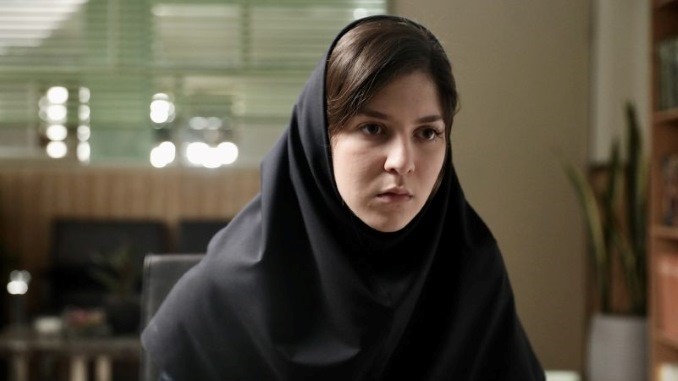
Ali Asgari and Alireza Khatami open Terrestrial Verses with Tehran’s skyline gradually brightening beneath a welcoming sunrise. The image is deceptive. Rather than a descent into darkness signaling imminent peril, Asgari and Khatami propose that we should be wary of the light instead. In Tehran, atrocities are committed in plain sight, smack dab in the middle of day, concealed only by office doors, assuming the folks committing bother concealing them at all. As if driving the point home, the film punctuates morning’s advent with cacophony comprising birds’ ominous caws, the din of alarms blaring and a chorus of voices joined in layered angst. This is not a happy city.
Its citizens aren’t happy, either, or maybe they are outside the circumstances Asgari and Khatami catch them in. Terrestrial Verses documents a cascade of transgressions, both micro and macro, made against its cast of nine principal characters: A new dad (Bahram Ark), students preteen (Arghavan Shabani) and teenage (Sarvin Zabetian), a rideshare driver (Sadaf Asgari), people seeking employment (Faezeh Rad and Majid Salehi), a man applying for a drivers license (Hossein Soleimani), a filmmaker (Farzin Mohades) and a dear elderly lady (Gohar Kheirandish) are each subjected to varied humiliations by Iran’s bureaucracy, for crimes those of us in the West can’t conceive of as criminal. Imagine being told the name you’ve chosen for your newborn son isn’t Muslim enough. Choose another one. “David” is forbidden.
The degrees Terrestrial Verses’ antagonists go to for the sake of exerting petty authority over its hapless leads read as alternately comical and cruel. Watching Ali, that previously mentioned beset-upon movie director, tear page after page out of his script each time a Cultural Council employee reads him notes about its content — namely, the paternal abuse of Ali’s upbringing — is pitch black humor with cringe-inducing power. On the other hand, retrieving a car from an impoundment lot may feel familiar for some, but being denied on account of a headscarf law violation probably doesn’t, nor does being coerced into stripping off clothing for an employee to show them a tattoo. Asgari and Khatami are addressing an international audience, but they’re speaking on behalf of their countrymen and the ignominies they suffer through every day in their homeland.
What’s unique about the film is less the material it’s made from, though, than the way it’s presented. Good direction isn’t always about acrobatic camerawork. It’s usually about placing the camera where it’s best suited. Asgari and Khatami’s cinematographer, Adib Sobhani, shoots Terrestrial Verses like an Errol Morris film, head-on with the lens locked right on the primary characters in each vignette. Their oppressors are never seen. Sobhani keeps them on the other side of the camera, where they are merely heard, as if the issuance of their judgment, criticism, harassment is enough to give them grounding.
Sobhani is right, of course. It isn’t important to see the faces of the film’s heavies. In fact, not seeing them enhances the film’s effect. The creep making increasingly brazen advances on young, shy Faezeh (Rad) in her job interview could be anybody; that intentional lack of identification is essential to Terrestrial Verses’ thesis about the overwhelming influence authorities have on the course of our lives, and how those authorities are so anonymous as to be invisible even to the people they prey on. (The movie doesn’t get into the details of who’s actually doing the preying, but that’s fine; the movie isn’t theirs, no matter their power.) Coupling that choice with static camerawork creates an utterly stifling environment for the characters and the audience alike, one where self-determination and liberty get snuffed out by the nonsensical rule of law.
The mounting abasement and indignity piled on Terrestrial Verses’ company grow so much that the only way they can be lifted is through extreme action, which explains the film’s final images — best seen and not summarized. But just as they do in their opening sequence, Asgari and Khatami invoke the celestial in their closer, adopting a heavenly perspective as Sobhani’s camera gently zooms in on the crumbling world outside of the movie’s suffocating office locales. The movement suggests divine observation, but that’s not the role Asgari and Khatami have given themselves; they leave the consequences of theocratic subjugation to higher powers and instead root themselves completely in the misery inflicted on people simply trying to make it through the day. For all of its cosmic implications, the film remains steadfast in its human devotions.
Directors: Ali Asgari, Alireza Khatami
Writers: Ali Asgari, Alireza Khatami
Starring: Bahram Ark, Arghavan Shabani, Sarvin Zabetian, Sadaf Asgari, Faezeh Rad, Majid Salehi, Hossein Soleimani, Farzin Mohades, Gohar Kheirandish
Release Date: April 26, 2024
Bostonian culture journalist Andy Crump covers the movies, beer, music, and being a dad for way too many outlets, perhaps even yours. He has contributed to Paste since 2013. You can follow him on Twitter and find his collected work at his personal blog. He’s composed of roughly 65% craft beer.